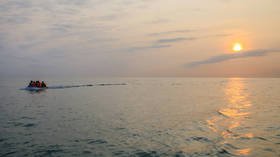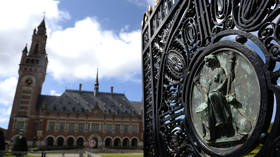As an ex-cop, I know how hard it is to stop the flow of illegal migrants into Britain
The UK is facing a crisis in the English Channel. As a former policeman with experience in Britain, France, Iraq and Afghanistan, I’m aware of the massive problems those on the ground face in trying to stop the influx of migrants.
With more and more people prepared to risk their lives by attempting to enter Britain via the Channel, it’s time for our politicians to earn their money. Getting into egotistical disputes with the French or trying to score points over the European Union will not help in solving this crisis.
We need to see emotionally intelligent diplomacy from politicians to garner some support from those EU countries we have walked away from.
Because one thing is certain – if nothing is done, a lot more desperate people will suffer appalling deaths trying to cross from France to England. And the global media will seize upon this, causing severe damage to Britain’s reputation worldwide. The fact that many people perceive most of the migrants to be coming from Muslim countries will not do anything to help community relations in the UK either.
Many British people are becoming increasingly worried about the failure of the post-Brexit government to take back control of our borders. Indeed, it seems that since Brexit, we have lost control of them. At least the French used to help us to check lorries at the ferry ports when we were in the EU.
With more than 30 years’ experience as a police officer – dealing with, among other things, illegal immigrants, asylum seekers, people traffickers, slavers and terrorists – I have some knowledge of the problems the UK Police and Border Force face in trying to deal with this ever-worsening situation.
Add to that two tours in Iraq and two recent ones in Afghanistan – where I was working with EU partners to try to reduce human trafficking – as well as many years spent in Africa, and I think I can say I have seen both ends of the spectrum. I am fully aware why this stream of migrants is coming Britain’s way.
Only recently I spoke to two former colleagues in Kabul, Afghanistan who are desperate to get their families out of the country to the West. One even expressed thoughts of attempting to cross the Channel in a small boat with his wife and four children, and asked my advice on the risks.
Sadly, I can’t offer an immediate solution to the crisis, although I do have some ideas. But at the risk of being immodest, if someone with my experience and background can’t produce the answers, that gives you an idea of the extent of the problem.
Let me start by telling you how out of touch and inept many of the proposals from the armchair experts and politicians of all hues are.
The first thing that anyone commenting on the situations needs to consider is how the French police – the Gendarmerie, controlled by the Ministry of Defence, the Police Nationale and Police Aux Frontieres, controlled by the Ministry of Interior and the various Police Municipales, controlled by town mayors – view this problem.
And I don’t mean their equivalent of superintendents or chief constables – I am referring to the ground-level operators, the gendarmes and agents de police. These are the people we might hope will stop the migrants getting to the rubber dinghies, or better still catch the bottom-end operators in the trafficking gangs.
I will let you decide how motivated two or three officers might be in trying to tackle 30 young men in the dark on a lonely beach as they attempt to launch a boat. Leave aside that the officers are probably cold, wet and bored, looking for potential migrants. How keen do you think they will be to get into a fight with desperate young men who have already risked their lives countless times to get to that beach? Not at all, you might think, and you would be right.
But the police patrol operator’s mindset is arguably much worse.
Most of us don’t consider that the police live locally to where they work, and that means their families do as well. So, these French police officers or gendarmes see hundreds of young men – and it IS mostly young men – wandering around their shopping malls on a daily basis. They see them in the parks where their kids play, and they see them on streets where their daughters walk to school.
Do not think for a moment that the wives and husbands of police officers do not discuss with their partners how disconcerting this is for them and their kids. I have been into the Calais Jungle camp as it was, walked around the town, the neighbouring villages and I didn’t like what I saw. Nor did I like the vibe.
Yes, I saw some tragic Kurdish families, but they were few and far between compared to the hordes of young men loitering about or just staring. I found it frightening.
Very simply, the local French police and gendarmes are sick of the migrants in their towns, and their families and friends feel the same. Even more relevant is the fact that the local mayors and politicians don’t like it either. Do not think for a moment that the mayors aren’t whispering in the ears of their officers. Everyone wants the migrants gone.
So the reality is that those two or three French cops on the beach are not going to do anything to prevent a large group of migrants try to launch their dinghy. Instead, they will use their search lamps to show the migrants to the boats, and even illuminate them as they attempt to get the outboard motor started. Just like everyone else, those French officers want the migrants somewhere else.
No amount of UK police, military or private security jointly patrolling with the French is going to change that, and it’s foolish to think otherwise. Remember, we are no longer an EU partner of the French, so we are not in the European Policing organisation Eupol, and do not participate in the European Arrest Warrant. British police would have no power to act on French soil anyway.
The truth is that the English are getting little help from the French local politicians and police operators now we are not in the European club, and they simply don’t want the migrants on ‘their patch’. That’s what Britain has to deal with.
This has led to a number of aggressive proposals from talking heads including sending in the Royal Navy, and getting the Border Force to push the boats back.
But this is easier said than done. First, you must find these little boats in a huge expanse of sea. Then you need to have a British vessel nearby. And there is the not inconsiderable problem of being unable to act within the 12-mile territorial limit for France. So, British boats can only intervene mid-Channel.
Consider the practicalities of a large Border Force cutter or Royal Navy patrol boat attempting to push a small rubber dinghy back to the 12-mile limit. Remember that dinghy is already overloaded with up to 40 people, some children. Imagine the international outrage if the Royal Navy caused a fully laden dinghy to capsize, tipping women and children into the freezing sea? That’s why the Border Force doesn’t try it now.
And if that hasn’t convinced you that reinventing a quasi-Battle of Britain spirit is a very bad idea, think of this. When the skipper of that patrol boat decides to push a dinghy back and it capsizes, killing people, he or she is likely to face charges of manslaughter in several different jurisdictions.
So, what can we do?
Firstly, we have to try and change the narrative that the UK is a land of milk and honey. That will be difficult because in relative terms to most other countries, it is indeed just that. It’s why I am proud to be British. We look after people, especially the vulnerable.
Moreover, since we have spent the past 150 years telling people how ‘Great’ Britain is, this will be a long-term project that will do further damage to our already tarnished and diminishing reputation. But we should try.
Secondly – and this will be the hard part for politicians – we must work with France and the EU nations to tackle the organised crime syndicates enabling this process. As we are no longer in Eupol, we are up against it here already on this front.
Thirdly, we need to look at what we can do at the source of the problem. We have to try to help the governments of the countries from which the migrants coming to improve the lot of their people so they will not want to leave their home nations.
That will be tough in Afghanistan, for example, because it means we will have to work with the Taliban. And it needs to be as a European collective; the UK can’t do this alone.
In short, now more than ever, Britain’s political leaders need to be both shrewd and conciliatory. They need to stop playing to some elements of their own electorate and try and see this issue through the eyes of the French and their fellow EU member states.
The British were once the masters of quiet diplomacy, and it’s time for our politicians to become statesmen and women again.
And as for the Border Force? They simply need to be prepared. Because in the short term at least, there’s going to be a lot more dinghies coming.
The statements, views and opinions expressed in this column are solely those of the author and do not necessarily represent those of RT.















